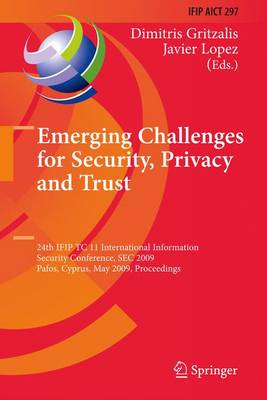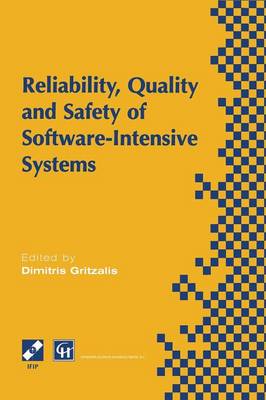IFIP Advances in Information and Communication Technology
1 primary work • 2 total works
Book 297
Emerging Challenges for Security, Privacy and Trust
by Dimitris Gritzalis and Javier Lopez
Published 14 May 2009
It was an honor and a privilege to chair the 24th IFIP International Information Se- rity Conference (SEC 2009), a 24-year-old event that has become a tradition for - formation security professionals around the world. SEC 2009 was organized by the Technical Committee 11 (TC-11) of IFIP, and took place in Pafos, Cyprus, during May 18–20, 2009. It is an indication of good fortune for a Chair to serve a conference that takes place in a country with the natural beauty of Cyprus, an island where the hospitality and frie- liness of the people have been going together, hand-in-hand, with its long history. This volume contains the papers selected for presentation at SEC 2009. In response to the call for papers, 176 papers were submitted to the conference. All of them were evaluated on the basis of their novelty and technical quality, and reviewed by at least two members of the conference Program Committee. Of the papers submitted, 39 were selected for presentation at the conference; the acceptance rate was as low as 22%, thus making the conference a highly competitive forum. It is the commitment of several people that makes international conferences pos- ble. That also holds true for SEC 2009. The list of people who volunteered their time and energy to help is really long.
Reliability, Quality and Safety of Software-Intensive Systems
by Dimitris Gritzalis
Published 30 April 1997
It is, indeed, widely acceptable today that nowhere is it more important to focus on the improvement of software quality than in the case of systems with requirements in the areas of safety and reliability - especially for distributed, real-time and embedded systems. Thus, much research work is under progress in these fields, since software process improvement impinges directly on achieved levels of quality, and many application experiments aim to show quantitative results demonstrating the efficacy of particular approaches. Requirements for safety and reliability - like other so-called non-functional requirements for computer-based systems - are often stated in imprecise and ambiguous terms, or not at all. Specifications focus on functional and technical aspects, with issues like safety covered only implicitly, or not addressed directly because they are felt to be obvious; unfortunately what is obvious to an end user or system user is progressively less so to others, to the extend that a software developer may not even be aware that safety is an issue. Therefore, there is a growing evidence for encouraging greater understanding of safety and reliability requirements issues, right across the spectrum from end user to software developer; not just in traditional safety-critical areas (e.g. nuclear, aerospace) but also acknowledging the need for such things as heart pacemakers and other medical and robotic systems to be highly dependable.

